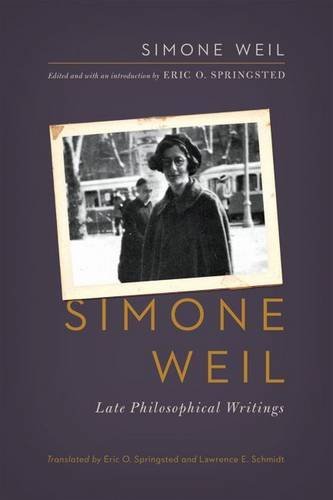
2015
First Published
4.13
Average Rating
216
Number of Pages
Although trained as a philosopher, Simone Weil (1909–43) contributed to a wide range of subjects, resulting in a rich field of interdisciplinary Weil studies. Yet those coming to her work from such disciplines as sociology, history, political science, religious studies, French studies, and women’s studies are often ignorant of or baffled by her philosophical investigations. In Simone Late Philosophical Writings, Eric O. Springsted presents a unique collection of Weil’s writings, one concentrating on her explicitly philosophical thinking. The essays are drawn chiefly from the time Weil spent in Marseille in 1940-42, as well as one written from London; most have been out of print for some time; three appear for the first time; all are newly translated. Beyond making important texts available, this selection provides the context for understanding Weil's thought as a whole. This volume is important not only for those with a general interest in Weil; it also specifically presents Weil as a philosopher, chiefly one interested in questions of the nature of value, moral thought, and the relation of faith and reason. What also appears through this judicious selection is an important confirmation that on many issues respecting the nature of philosophy, Weil, Wittgenstein, and Kierkegaard shared a great deal.
Avg Rating
4.13
Number of Ratings
48
5 STARS
38%
4 STARS
44%
3 STARS
15%
2 STARS
2%
1 STARS
2%
goodreads
Author

Simone Weil
Author · 51 books
Simone Weil was a French philosopher, Christian mystic, and social activist. Weil was born in Paris to Alsatian agnostic Jewish parents who fled the annexation of Alsace-Lorraine to Germany. Her brilliance, ascetic lifestyle, introversion, and eccentricity limited her ability to mix with others, but not to teach and participate in political movements of her time. She wrote extensively with both insight and breadth about political movements of which she was a part and later about spiritual mysticism. Weil biographer Gabriella Fiori writes that Weil was "a moral genius in the orbit of ethics, a genius of immense revolutionary range".